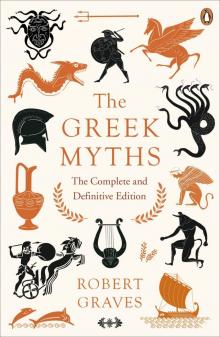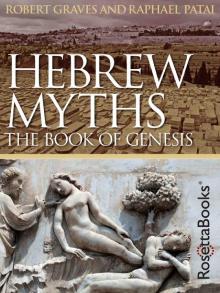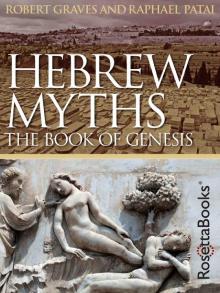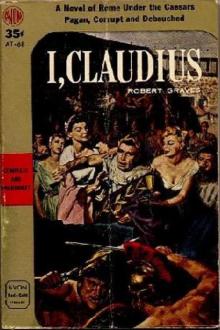- Home
- Robert Graves
The Golden Fleece Page 7
The Golden Fleece Read online
Page 7
‘A wise suggestion,’ said Pelias, hoping that the stranger would destroy himself by a careless answer of the next question. ‘And would you perhaps commit the command of the expedition to the boldest man in your dominions?’
‘He would need to be the boldest man in all Greece, I believe,’ the stranger answered, with the same impudence, ‘to undertake that task.’
‘You are the very man,’ cried Pelias.
‘I?’ asked the stranger, taken aback.
‘You,’ said Pelias. ‘To come armed and alone, as you have done, to a festival at which no weapons are permitted, to address the ruler of the city as ‘Greybeard’ and refuse him your name, to throw random taunts at Father Zeus, who is the King of Heaven and the principal God of Greece – this has proved you the boldest man in the whole world, not merely in my kingdom of Phthiotis.’
He answered hotly: ‘I have never in my life shrunk from any adventure. Yet I shall not go in search of the Golden Fleece unless you swear that on my return – for I shall not return empty-handed, you may depend on that – you will yield the regency of this kingdom to me.’
Pelias replied: ‘Fool, I cannot make any such absurd undertaking. This kingdom by law can only be ruled by a Minyan, a member of the royal family. When my brother Aeson dies I shall succeed him in the title as well as in the power of kingship, because I am now his nearest heir of Minyan blood – my comrades killed his two sons and two brothers who stood nearer than I did; and when I die the kingdom will duly pass to Acastus, my eldest son.’
The stranger shook his head slowly. ‘I think,’ said he, ‘that it will not.’
Pelias asked: ‘Why do you shake your head and say that you think it will not? Not even a God can alter the laws of inheritance.’
The stranger explained: ‘At the age of two years I was secretly rescued by a palace servant from the sack of this city, and given into the safekeeping of the Centaurs, who took good care of me. Now for sixteen years I have been under the tutorship of Cheiron son of Philara. I have today come down to Iolcos, to the festival, where I had hoped to participate in the sacrifice to the Goddess. I beg you to excuse my rough appearance: this deer-skin tunic of mine was torn on an acanthus bush during my swift descent, and I seem to have lost one sandal – perhaps in the mud of the swollen Anauros as I forded it. I am Diomedes, the only surviving son of your brother Aeson; but Cheiron has renamed me Jason. I, not you, am the nearest heir to the Minyan throne.’
‘Do not vex the Gods with your nonsense,’ cried Pelias sharply. ‘It is well known that Diomedes died in the burning palace and was duly mourned and buried.’
‘It was not Diomedes who died,’ said Jason, ‘but a slave-boy, and here in my wallet are my infant garments of purple wool, unscorched by fire, to prove my story true.’
Pelias’s heart sank in him, but he feared to display anger or to do Jason any injury on such a sacred occasion. He contented himself with saying dryly that Jason must think every ill of his courage if he expected him to resign all his wealth of gold, jewels, cattle, and grain without a struggle.
Jason answered: ‘Why, Uncle, I said nothing about taking your wealth from you. Keep it, it is yours to do as you please with. All I ask is that you acknowledge me my father’s heir. And since my father has not thought fit to avenge on you the murder of his brothers and sons, it would not become me to do so either.’ He said this in all innocency, because his rough life in the mountains had not taught him that a king without wealth is like a spear without a shaft. A king must have revenue with which to pay his soldiers and servants and provide hospitality for visiting princes and sacrifices for the Gods; and to spend on a thousand other things.
Pelias did not know whether Jason was very simple or very shrewd and stood silent for a while. Then he laughed aloud and embraced him in the friendliest manner, welcoming him back to his native city with feigned expressions of joy. But as he took him by the arm and led him to the house where Aeson lay bed-ridden, he began to sigh heavily. He said: ‘Jason, Jason, why did you not confess at once whose son you are? Then I should never have asked you the question to which, inspired by some God (perhaps by my Father Poseidon himself, the chief guest at our feast), you make an unretractable answer before witnesses. There is nothing for it now, but that you must go in search of the lost Fleece, and when you come back, drawn by the hopes and prayers of this whole people, I shall willingly resign the regency of Phthiotis in your favour and become your loyal and devoted comrade.’
An expression of dismay had settled on Jason’s face when he understood how dearly he must pay for his indiscreet words, and Pelias now showed him how seemingly hopeless a task the recovery of the Fleece was, by telling him of King Aeëtes and his hostility to the Greeks.
Two years after Phrixus and Helle had fled from Iolcos, news had come to Cretheus, the regent, that Helle had been drowned in the Trojan Strait, but that Phrixus had presented the Fleece to Aeëtes, son of Heleus, King of Colchis, who had put it under the protection of the hero Prometheus. Upon hearing this news, Cretheus had debated with his chieftains whether or not he should send to Aeëtes demanding the Fleece, for there was a presentiment among them that the good luck of the Minyans was bound up with it; but they decided not to risk the anger of the White Goddess, and therefore nothing was done. However, some years later Aeëtes heard that his nephew Sisyphus, to whom he was bound by the most solemn oaths of friendship, had been deposed and enslaved for refusing to recognize the new subservience of the Triple Goddess to her former sons, Zeus, Poseidon, and Hades. This news angered him excessively, for Sisyphus had been King of Asopia, the western half of the double kingdom of Corinth, whereas the eastern half, including the isthmus and the city of Ephyra, was his own; he had left his lands under the stewardship of his friend Bunus, but Sisyphus had been acting as regent of the people. Aeëtes therefore swore to massacre the first crew of Greek seamen who dared venture into Colchis, unless they brought him news of the release and restoration of his nephew Sisyphus. But so far from releasing Sisyphus or restoring the old religion in Corinth, the new Achaean governor issued a public proclamation denying that the city had, as everyone thought, been founded by a priestess of the Maiden Goddess Ephyra. He asserted, instead, that it had been founded by a champion named Corinthus, a devotee of Zeus, from whom Ephyra had stolen the glory, and that the original name, Corinth, since applied to the whole kingdom, must now be restored to it. He confiscated the lands of King Aeëtes, on the ground that his title to it, which derived from Ephyra, was invalid; and Asopia passed into the possession of his friend Creon who had married Glauce, the daughter of Sisyphus, against her will.
Since that time there had been no direct communication between Colchis and Greece; and the Trojans acted as middlemen for trade. This was a great inconvenience to the Greeks, for whereas the toll that the Trojans had formerly levied was only a fifth part of the agreed value of the cargo, now they sold Colchian goods to the Greek merchant-captains for twice or three times as much as they had paid for them. Troy was a strong fortress, built of huge blocks of stone by Egyptian masons, like Mycenae and the other Greek cities, and well guarded. The Greeks threatened to send an expedition to destroy the place if the Trojans refused to act more reasonably; but did not yet feel strong enough to carry out their threat. King Aeëtes was said to have signed an agreement with the Trojans by which he promised to trade with no other western nation but theirs, on condition that they paid him a fair price for his goods and that they held the straits against any punitive expedition that might be sent against Colchis from Greece.
Pelias told Jason of all these circumstances, sighing deeply throughout his narration. He hoped that Jason, deeply discouraged by the difficulties of his task, would sneak back to Pelion and the company of his fellow-Centaurs; which would so discredit him in the eyes of the Minyans that he would never be able to show his face again in the market-place of Iolcos. Or, better still, he would be stung by shame into attempting a voyage for the recovery of the Fleece, which,
Pelias reasoned, could only end in disaster. Even if he eluded the watchful Trojans on the outward voyage, how could Aeëtes be possibly persuaded to give up the Fleece while he still had a powerful army and a powerful fleet? And if, which was almost incredible, Jason should succeed in stealing the Fleece by a sudden bold descent, how would he contrive to pass through the Hellespont a second time? The Trojans would be waiting for him and, after examining his cargo, would hold him until the pursuing Colchian fleet came up; and then he would be killed. For there is no known way out of the Black Sea except by way of the Bosphorus and Hellespont.
Pelias had trapped Jason prettily, as he thought. Nevertheless, Jason put a bold face on the matter, and said to him: ‘Dear Uncle, let us leave behind all gloomy thoughts and go together to the house of my parents, whose faces I have not seen since I was a child of two years old. I wish to embrace them and receive their blessing.’
So while the sacrificial meats were still roasting, turned slowly on spits with a pleasant smell and hissing noise over the bonfires in the marketplace, Pelias led Jason to the modest house of his parents whom he saluted reverently. Alcimede was overjoyed to see her only child once more, and pressed him feverishly to her bosom; but Aeson, who had started up to a sitting posture from the couch where he lay dozing under a pile of blankets, grew pale, shrank back again and turned his face to the wall. While Jason had been away among the Centaurs, Aeson had thought of him with paternal affection and hope but now that he had come boldly down from the mountain and revealed himself to Pelias, Aeson was overcome by doubts and fears and almost hated him. He expected to be called to account by Pelias for never having confessed to him the fraud of the mock-funeral; and feared that he would seize the first pretext that occurred to him for putting both Jason and himself to death. So Aeson muttered unintelligibly over his shoulder and paid no attention either to the eloquent protestations of loyalty that Pelias uttered or to his congratulations on Jason’s return as it were from the dead. When Pelias praised Jason to his face for his strength and beauty and courage Alcimede rejoiced, forgetting what ill-luck such praise brings, forgetting that the Spites are always hovering about, in the form of blue-flies or moths or mosquitoes, and fly off with the news to the jealous Olympian Gods or those of the Underworld; but Aeson continued to groan.
Pelias left Jason with his parents and returned to the market-place. There, when his chief herald had blown on a conch-shell three times, to command silence, he loudly ordered the people to rejoice with him, now that Jason, heir to the throne of Minyan Phthiotis, had unexpectedly returned to them. ‘And a most courageous and reverent young man he has proved to be,’ said Pelias, ‘after his schooling in the cave of honest Cheiron the Centaur, who has all these years concealed him – I do not know why – under a false name and pedigree. Indeed, so courageous and so reverent is this Jason that he refuses to settle tamely among us yet awhile. He must first do great deeds, he declares, and show a deep respect for Father Zeus, the ruler of the Gods, by restoring the lost Fleece to the Ram image of Mount Laphystios. May every God and Goddess,’ he said, ‘favour his princely intentions! And may no Minyan prince of equal courage with Jason stand back from so glorious an enterprise!’ For Pelias hoped to involve twenty or thirty Minyan nobles, the natural enemies of the Achaeans, in the death of his upstart nephew.
The people, who were already intoxicated with mead and beer, cheered Pelias’s speech with a prolonged roar, and when they saw Jason coming again into the market-place to take his share of the roast meats, they ran to greet him with cries of admiration. Those who wore garlands of winter flowers and berries crowned him with them, while others drunkenly kissed his hands or stroked his shoulders.
Jason had not a word to say in reply. Already he walked like the uncomprehending victim that is conducted to the sacrifice, wreathed in garlands, white the greedy worshippers smack their lips and shout aloud for joy with: ‘Ah, how handsome a beast! How tasty a morsel for the Gods, and for ourselves!’
Pelias was in so cheerful a mood that he feasted Jason at the palace for five days and nights.
Chapter Five
The White Goddess Approves the Voyage
Jason returned to Mount Pelion to ask Cheiron’s advice. Cheiron was surprised to see him still alive. He knew Jason’s hasty temper and had begged him not to make the journey, which he was sure would bring nobody any luck. He shook his head sadly when Jason reported what had happened in the market-place at Iolcos, and said: ‘Child, the news that you bring could hardly have been worse. Either you will fail in your enterprise and be killed by the Colchians or their Trojan allies, or else (which is, however, far less likely) you will recover the Fleece and Zeus the Ram will return to this shrine and once more oust our beloved Mother. Oh, your tongue! How often have I told you that a man who ventures alone among enemies must keep his mouth closed and his ears open? You have disgraced my cave.’
Remorsefully Jason begged Cheiron at least to consult the Goddess for him, to learn what course he should follow. He undertook that, if the Goddess ordered him to abandon the enterprise and thereby make himself ridiculous in the eyes of his fellow-Minyans, he would obey her nevertheless and renounce all claims to the throne of Phthiotis.
Cheiron that night purified himself, entered into the Goddess’s shrine and laid his head on a pillow of trefoil, which, because of its three leaves joined together in one, is sacred to the Triple Goddess and induces true dreams. At midnight the Goddess, as it seemed to him, stepped down from her throne and spoke as follows:
‘Cheiron, to you as my trusty servant I dare reveal more of the truth than I find convenient to reveal to the uninitiated. In the first place, you must understand that the power of a Goddess is circumscribed by the condition of her worshippers. The iron-weaponed Achaeans have brought so great an access of strength to my rebellious son Zeus that I can no longer gain my ends directly. Even in my contest with Athamas the Aeolian, who was a far less formidable opponent than this bitch-suckled Achaean Pelias, I was obliged to contrive a tortuous plot and pretend compliance with his religious innovations. However, I have marked down Pelias for destruction just as surely as I marked down Athamas, and intend to take my revenge on every one of my other human enemies in turn; and upon my husband Zeus too. I am a very long-lived, patient Goddess, and it pleases me to take my time and keep my temper. You know how implacable I was in the case of Theseus the Athenian. I had little cause to complain of him at first when he sacked Cnossos and punished Minos for me; because he treated myself and my priestesses with due respect. But when later in Attica he began to show rebelliousness and furtively removed from their shrines two images of myself as the Maiden Goddess, the one worshipped as Helen and the other worshipped as Persephone, I persuaded his people to banish him. He fled to the isle of Scyros, where he had inherited an estate; but I prompted the King of Scyros to lead him to the highest cliff in the whole island, as if to show him the extent of his property, and then push him down headlong. And Peirithoüs, the trusty companion of Theseus, fared even worse at my hands.
‘Now it has suited my humour to enter the Olympian family as Zeus’s wife, rather than to remain outside as his enemy; I can lead him an insufferable life by my nagging and spying and mischief-making, just as he was a continual torment to me when he was my surly son and I was in authority over him. And my self-multiplication into his divine sisters and daughters increases his difficulties.
‘You must not suppose that it was of Jason’s own accord that he taunted his uncle in the market-place of Iolcos. Jason, as you know, is a wild and witless young man, despite your careful education of him, and an easy subject for my unsuspected promptings. Have you heard how he came to lose his sandal? During his descent from Pelion, when he had passed successively through the pine forests and the thickets of arbutus and acanthus, and across the thyme-covered meadows, I appeared to him in the withered person of Iphias, priestess of Artemis, who is in my confidence. I promised him good luck if he carried me over the flooded Anauros. At
first he refused, but then thought better of it and took me up on his shoulders. At once I put him into a trance and taught him the very words which he afterwards spoke to Pelias. When he set me down on the further bank I broke the trance and made a Gorgon grimace at him, rolling my eyes and sticking out my tongue. At once he pulled off his sandal and threw it at me to break the spell. I bent aside; the sandal fell into the brook and was carried away.
‘This hasty-mouthed Jason, though the meaning of his name may be “Healer”, is destined to be a poison in the belly of Greece and a breeder of innumerable wars, like my mad servant Hercules; but let that be the affair of Zeus not mine, since Zeus has usurped my power. I am sending Jason to Colchis for one immediate purpose only: to consign to the earth the ghost of my servant Phrixus which still hovers disconsolately between the jawbones of his unburied skull, so that he may at last enter into the eternal rest that I promised him. If Jason wishes at the same time to recover the Fleece, I care not. The Fleece is nothing in itself – a cast garment – and its return to Zeus will serve to recall the humiliation which I once forced him to accept at my hands. Guard well the secrets that I have revealed to you. Jason needs to be told merely this much: he may go to Colchis with my favour, but upon the one condition, that before he makes his attempt on the Fleece he must demand from Aeëtes the bones of his kinsman Phrixus, and must bury them in a decent manner, wherever I may prompt him to do so.’
Jason was relieved to learn that he had not forfeited the Goddess’s favour. Despite his rash tongue he was timorous enough wherever the favour of Gods or Goddesses was concerned. It seemed to him now that he was extraordinarily fortunate: he could count upon the Goddess to raise no obstacles to his journey, even though it was to be made chiefly on behalf of Zeus. Now he must scrupulously avoid any action that might possibly stir the enmity or jealousy of either deity. Since he would be obliged to inform his fellow-Minyans, as a means of persuading them to join him, that the Goddess in a dream had promised him her favour, it would be prudent to consult the Oracle of Zeus as well; otherwise, the priests of Zeus might suspect that the voyage had been undertaken on secret instructions from the Goddess, with some injurious intention.

 The Greek Myths, Volume2
The Greek Myths, Volume2 The Anger of Achilles: Homer's Iliad
The Anger of Achilles: Homer's Iliad Count Belisarius
Count Belisarius The Twelve Caesars
The Twelve Caesars Complete Poems 3 (Robert Graves Programme)
Complete Poems 3 (Robert Graves Programme) Homer's Daughter
Homer's Daughter The White Goddess
The White Goddess Goodbye to All That
Goodbye to All That Claudius the God and His Wife Messalina
Claudius the God and His Wife Messalina The Greek Myths
The Greek Myths I, Claudius
I, Claudius The Islands of Unwisdom
The Islands of Unwisdom Complete Short Stories
Complete Short Stories The Golden Fleece
The Golden Fleece They Hanged My Saintly Billy
They Hanged My Saintly Billy King Jesus
King Jesus Sergeant Lamb's America
Sergeant Lamb's America Hebrew Myths: The Book of Genesis
Hebrew Myths: The Book of Genesis Seven Days in New Crete
Seven Days in New Crete Proceed, Sergeant Lamb
Proceed, Sergeant Lamb Claudius the God
Claudius the God Wife to Mr. Milton
Wife to Mr. Milton The Complete Poems
The Complete Poems The Anger of Achilles
The Anger of Achilles Claudius the God c-2
Claudius the God c-2 Hebrew Myths
Hebrew Myths I, Claudius c-1
I, Claudius c-1 The Greek Myths, Volume 1
The Greek Myths, Volume 1